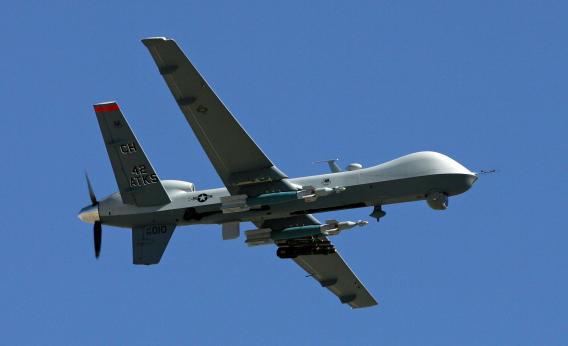President Obama never used the word drones in his State of the Union address. But drones were all over it. They’re the unspoken force that is shaping his agenda.
A minute into the speech, Obama reported, “After a decade of grinding war, our brave men and women in uniform are coming home.” That’s all the president had to say about foreign affairs for the next 38 minutes. And it wasn’t even about going somewhere. It was about returning.
Who’s coming home? Our people. Who’s taking their place? Machines. By outsourcing our global police work to remotely piloted aircraft, Obama was able to spend almost his entire speech talking about domestic challenges instead.
It was nearly 10 p.m. ET by the time he got to his first paragraph about events abroad: “Tonight, we stand united in saluting the troops and civilians who sacrifice every day to protect us. Because of them, we can say with confidence that America will complete its mission in Afghanistan and achieve our objective of defeating the core of al-Qaida.”
Afghanistan? The core of al-Qaida isn’t being destroyed in Afghanistan. It’s being destroyed in Pakistan. We don’t have troops in Pakistan. We have drones.
“Already, we have brought home 33,000 of our brave servicemen and women,” said the president. “Tonight, I can announce that over the next year, another 34,000 American troops will come home from Afghanistan. This drawdown will continue. And by the end of next year, our war in Afghanistan will be over.”
The war in Afghanistan may be over, but the war in Pakistan will go on. Except we won’t call it a war, any more than we do today, because we don’t have skin in that game. We have metal. We can go on killing al-Qaida and Taliban operatives by remote control without thinking of it as a war.
The president went on: “We are negotiating an agreement with the Afghan government that focuses on two missions: training and equipping Afghan forces so that the country does not again slip into chaos, and counter-terrorism efforts that allow us to pursue the remnants of al-Qaida and their affiliates.”
Counter-terrorism efforts. In other words, drones.
To defeat al-Qaida and its allies, said Obama, “We don’t need to send tens of thousands of our sons and daughters abroad, or occupy other nations. Instead, we will need to help countries like Yemen, Libya, and Somalia provide for their own security, and help allies who take the fight to terrorists, as we have in Mali. And, where necessary, through a range of capabilities, we will continue to take direct action against those terrorists who pose the gravest threat to Americans.”
A range of capabilities. Direct action. In other words, drones.
To members of Congress who worry that the drone program is unsupervised, Obama offered this assurance: “My administration has worked tirelessly to forge a durable legal and policy framework to guide our counterterrorism operations. Throughout, we have kept Congress fully informed of our efforts.”
Fully informed? This, from an administration that continues to withhold even the legal memos that supposedly justify its targeting practices?
“I will continue to engage with Congress,” Obama pledged, “to ensure not only that our targeting, detention, and prosecution of terrorists remain consistent with our laws and system of checks and balances, but that our efforts are even more transparent to the American people and to the world.”
Even more transparent? You mean, you might even tell people what you’re talking about, instead of calling it direct action, counterterrorism operations, and a range of capabilities?
The only weapons Obama was willing to discuss openly were the firearms he wants to restrict at home. “Police chiefs are asking our help to get weapons of war and massive ammunition magazines off our streets,” he said. He recited the litany of recent tragedies: Tucson, Newtown, Aurora, Oak Creek. It’s a grim list. But these incidents dominate our national thinking about violence, and they punctuated the president’s speech, because greater threats have receded. We don’t fear another 9/11. We don’t worry about body bags coming home from another war. The drones will take care of it.
Can drones do all that? Can they substitute for deployments overseas? Can they protect us from attacks? Can they free us to focus on the domestic economy and ignore the rest of the world? Not really. But this is the role they play psychologically. They hunt and kill people who want to harm us. The drones make us feel safe. We don’t have to worry about them, because they don’t bleed. And we don’t have to worry about what they’re doing, because we can’t see it. What happens in Pakistan stays in Pakistan.
That’s what we tell ourselves. We don’t really want to know what’s going on over there, any more than we want to see those secret legal memos or find out what the president means by counterterrorism operations. We just want to come home, stay home, and deal with our problems here, knowing that up in the sky, someone or something is watching over us.
William Saletan’s latest short takes on the news, via Twitter:
